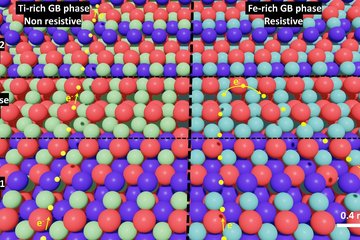All genres
841.
Talk
Simulations of grain boundary migration via the nucleation and growth of islands. DPG Frühjahrstagung 2012, Berlin, Germany (2012)
842.
Talk
Fully ab initio determination of anharmonic contributions by efficient sampling strategies. TMS 2012, Orlando, FL, USA (2012)
843.
Talk
Ab Initio Thermodynamics of the fcc-bcc Transition in Ca Including All Relevant FiniteTemperature Excitation Mechanisms. TMS 2012, Orlando, FL, USA (2012)
844.
Talk
Accelerated self-diffusion in fcc metals due to H induced superabundant vacancies. TMS 2012 Meeting, Orlando, FL, USA (2012)
845.
Talk
On the Role of Mg Atoms in Calcite Crystals: An Ab Initio Study. EURO Bio-inspired Materials, International School and Conference on Biological Materials Science, Potsdam, Germany (2012)
846.
Talk
On the role of Mg atoms in calcite crystals: An ab initio study. DPG Frühjahrstagung, Berlin, Germany (2012)
847.
Talk
Vibrational spectra of charged point defects in ionic oxides. DPG Frühjahrstagung 2012, Berlin, Germany (2012)
848.
Talk
Advancing ab initio to finite temperatures for applications in materials design. DPG Frühjahrstagung 2012, Berlin, Germany (2012)
849.
Talk
Long time scale simulations to determine accurate ab initio free energies. Beyond Molecular Dynamics (BEMOD) workshop, Dresden, Germany (2012)
850.
Talk
Fully ab initio determination of free energies: Where do we stand? TMS Spring Meeting, Orlando, FL, USA (2012)
851.
Talk
Nanostructuring of 1 Mio tons: Designing ultrastrong and ductile steels. DPG meeting (Deutsche Physikalische Gesellschaft), Berlin, Germany (2012)
852.
Talk
The art of experimentation in micromechanics: Lattice defects in steels. GAMM Conference, Darmstadt, Germany (2012)
853.
Talk
Joint DFT and TEM study on the ductilizing effect of rare earth elements (RE) on Mg alloys. TMS 2012 Annual Meeting, Orlando, FL, USA (2012)
854.
Talk
Crustacean skeletal elements: Variations in the constructional morphology at different hierarchical levels. DFG Winter School Priotity Programme 1420: "Biomimetic Materials Research: Functionality by Hierarchical Structuring of Materials", Potsdam, Germany (2012)
855.
Talk
Quantitativly optimized atomic orbitals (QUAMOLs) - SxQuamol. 1st International S/PHI/nX Developers Convention, Erkrath, Germany (2012)
856.
Talk
Ab-initio study of phase transitions in Magnetic Shape Memory Alloys. SPP1239 focus meeting, IFW Dresden, Germany (2012)
857.
Talk
Influence of alloying elements on solubility and diffusivity of H in different steel phases. HYDRAMYCROS Workshop, Ghent, Belgium (2012)
858.
Talk
Why do co-deformed composites have high strength after phase dissolution? SurMat Seminar 2012, Meschede, Germany (2012)
859.
Talk
Nanostructuring of 1 Million tons: Designing steels using quantum mechanics and atom probe tomography. Seminar Talk at University of Saarland, Saarbrücken, Germany (2012)
860.
Talk
Towards an ab-initio based understanding of H-embrittlement: An atomistic study of the HELP mechanism. Joint Hydrogenius and ICNER International Workshop on Hydrogen-Materials Interactions, Kyushu, Japan (2012)











